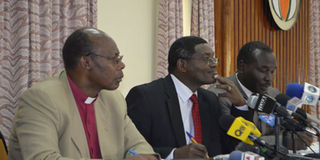Needed: National conversation on how to change and energise Kenya

NCCK secretary general Rev Canon Peter Karanja (centre) said national dialogue was not a preserve of politicians but an all-inclusive process that should not be hijacked by a section of the society.. PHOTO/ANNE MACHARIA
What you need to know:
- Tribalism thrives and graft grows; the economy shrinks and unemployment expands; debt skyrockets and poverty pervades the land.
- Let Kenyans truly tell themselves this is who we want to be and this the Kenya we want.
What is the more urgent challenge? Youth unemployment of 26.21 percent or lack of a prime minister's office?
Listen. Kenya does not need a referendum on changing the constitution to introduce a premier’s office or to expand the Executive ostensibly to stem perennial post-poll discontent.
It needs a national conference; a marketplace of ideas, to discuss its regeneration at 55. Even a corporation, when it celebrates its Golden Jubilee, plans its regeneration as it starts the journey to a century of existence.
Kenya needs a national conversation because politicians want to stampede the country into a referendum about power and for power in a new power-play which, like its numerous predecessors, will stitch up the very people, in whose name the power is sought.
DEVELOPMENT
Kenya needs a new approach and to do things differently as it resets the development button.
This is so because for 55 years we have elected and sworn in presidents and MPs; formed cabinets; and proclaimed policies.
But regional, economic, infrastructural and developmental disparities persist and grow.
Tribalism thrives and graft grows; the economy shrinks and unemployment expands; debt skyrockets and poverty pervades the land.
This time round Kenyans should hold an indaba and collectively figure out what’s amiss, why it’s remiss, and how it should be redressed politically, legally and ethically in terms of equity, inclusivity, fraternity and, above all, leadership (power) with responsibility.
GENERAL ELECTION
Let Kenyans truly tell themselves this is who we want to be and this the Kenya we want.
Thereafter let them task politicians with effecting the Kenya the people want. That is, proceed from a national conversation to a General Election to choose the people to implement agreed agenda.
This way the people will truly have spoken and hired and fired based on objectives defined by them. They will not have been manipulated and sold slogans, but will have set out the stalls from which the politicians must buy their service charter.
This way, the politicians will be servants to fulfil the people’s agenda. Kenyans will, then, rejuvenate their politics.
As things stand, the politicians, especially those who until March 9 were the opposition, have not generated new ideas to kick-start Kenya’s political reinvention or economic resurgence.
VESTED INTERESTS
And Parliament, now conveniently united by the March 9 cop out of Mr Raila Odinga, cannot vouch, or vote, for a people’s cause.
Bereft of opposition and in the clutches of vested interests, Parliament is captive to the secret presidential succession game play of President Kenyatta and Mr Odinga.
When Parliament does not stand up for the people, the people must stick up for themselves.
When Kenya’s political leadership makes the presidential succession and a feverish attempt to craft a presidential legacy in the final term the be-all and end-all of Kenyan life, Kenyans must find a way to be seen and heard.
By holding a national conversation, Kenyans will redefine the popular phrase heeding the call of the people.
The first rule of politics is self-interest but this is often dressed up as service to the public.
MANIFESTOS
Therefore the public will be best served when they have spelt out the service and services they want. Then, politicians will serve the people by delivering on what the public want of them.
When Kenyans make known what they want in a national conversation, then, politicians will complete the picture by competing to spell out how they will achieve the people’s wants. Their manifestos will have their foundations in what the people want and not in what they (politicians) prescribe for the people.
This way Kenyans will take the responsibility for, and indeed own, the political process.
They will be able to hold MCAs to account instead of them holding their electors to ransom and ripping the public purse. And they will also hold the president’s, MPs’ and governors’ feet to the fire because the electorate, and not their representatives, will have set the mandate for representation.
DEVOLUTION
Last, which could well be first, it is at the national conversation that Kenyans will discuss their eight-year-old constitution and decide which parts of it need fine-tuning and which discarding altogether.
And they will zero in on strengthening devolution while taming profligate spending and wanton wastage by the national and county governments.
Ideas, especially on inclusivity, not an expanded Executive, will reinvigorate Kenya. A Bomas-style people’s dialogue should be preferred to a politicians’ mistruths-fuelled plebiscite.
The dialogue should be themed Power With Responsibility: How to Change and Energise Kenya.





